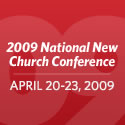
“I’m a Fan of Keeping the Church Small”
Orginally published on Monday, February 16, 2009 at 8:40 AM
by Todd Rhoades
What do you think of this quote by Kirk Anderson, the pastor of a small church in Arizona...
"I'm a fan of keeping the church small. We're a relationship-based church, and I like to commune by name."
[HT: The Dallas News Religion Blog] What do you think?
![]()
This post has been viewed 683 times so far.
There are 21 Comments:

Hi... I'm Todd Rhoades. I'm a Christ-follower, husband, father and I love to connect leaders with other leaders. Hopefully you'll find something here at MMI you like and will return often. If you want, you can find out more about me or follow my every step on Twitter.
![]()







-
Posted by Jesse Phillips
Monday, February 16, 2009 at 9:27 AM
-
Posted by
Monday, February 16, 2009 at 10:29 AM
-
Posted by Ryan Plantz
Monday, February 16, 2009 at 10:30 AM
-
Posted by Mike Silliman
Monday, February 16, 2009 at 10:38 AM
-
Posted by
Monday, February 16, 2009 at 10:48 AM
-
Posted by
Monday, February 16, 2009 at 11:03 AM
-
Posted by Andy Wood
Monday, February 16, 2009 at 11:08 AM
-
Posted by Derek Vreeland
Monday, February 16, 2009 at 11:12 AM
-
Posted by Bart
Monday, February 16, 2009 at 11:22 AM
-
Posted by David Brown
Monday, February 16, 2009 at 11:36 AM
-
Posted by
Monday, February 16, 2009 at 12:09 PM
-
Posted by
Monday, February 16, 2009 at 12:18 PM
-
Posted by
Monday, February 16, 2009 at 1:11 PM
-
Posted by
Monday, February 16, 2009 at 1:16 PM
-
Posted by Peter Hamm
Monday, February 16, 2009 at 1:42 PM
-
Posted by
Monday, February 16, 2009 at 5:54 PM
-
Posted by Matt Perkins
Tuesday, February 17, 2009 at 5:17 PM
-
Posted by
Tuesday, February 17, 2009 at 10:39 PM
-
Posted by
Tuesday, February 17, 2009 at 11:56 PM
-
Posted by Peter Hamm
Wednesday, February 18, 2009 at 8:56 AM
-
Posted by Sam C
Thursday, February 19, 2009 at 11:34 AM
Post Your Comments:I think I would like to see the 19 other comments before I comment - is there a way to view comments without commenting yourself? Here’s my URL http://mondaymorninginsight.com/index.php/site/comments/im_a_fan_of_keeping_the_church_small/ there doesn’t seem to be.
About keeping the church small - that’s interesting. I wonder why he says that? I can think of several reasons myself. I think it’s harder to achieve community in larger churches, so I can understand why you’d want to keep things small. I assume you’d have a greater community, higher accountability, greater investment in each others’ lives and hopefully greater spiritual growth - I wonder if that’s true.
Dave Browning is doing something interesting, where instead of growing up in one place, they grow outward and multiply a lot! It seems they are able to keep intimacy, authenticity, community at a maximum, while still reaching tens of thousands for Christ. I, personally, like this strategy, though I haven’t been a part of it.
We have a lot of people that call themselves church planters but seem intent on merely establishing the next mega-church with multi movie screen campuses. I like the idea of churches COMPLETELY dividing at 200-300 people and getting out to under reached confines.
I’m completely sick of the entrepreneurialism that Christendom is today.
Acts 2:41 - 41 So those who received his word were baptized, and there were added that day about three thousand souls.
Acts 4:4 But many of those who had heard the word believed, and the number of the men came to about five thousand.
I’m not sure Jesus was a huge fan of keeping the church small. It is understood that they met in homes on a regular basis, but it is also clear in scripture that everyone (the thousand) met to together for meetings. In Acts 6, we see the massive church addressing a major problem with Hellenistic Jewish widows. 7 spirt-filled men were selected to address this (and probably other problems). This was not a ‘house-church’ issue. This was a mega-church issue.
I love my kids being small too, but I know if they are healthy and growing they won’t stay little forever. I need to cherish every stage that God has them in. I’m not going to purposely stunt their growth, and neither am I going to purposely force them to grow.
I believe it’s impossible to follow the guidelines of church discipline ( laid out in 1Corn. 5 among others ) in a large/mega church. The accountability is lost when you can come and go without anyone knowing you when ever there.
I see large churches so focused on the money & numbers
( which go hand in hand), that they are willing for sacrifice what makes a church a church.
What if the person who lead you to Christ had that same attitude? What if he/she preferred that there was no room in God’s family for you because he/she wanted to know everybody by name? It is another form of consumerism--"us for and no more”. Mutual accountability and evangelistic growth are NOT exclusive of one another!!
I think small vs. large is a false dichotomy. It’s possible to have both in the same congregation. Yes, it’s work, and yes, it’s impossible for one senior/lead pastor to know everyone intimately in that kind of arena. But the fact remains, churches don’t have to give up their “smallness” in order to reach more people.
No problem with keeping an individual church small as long as we continue to reach the lost and multiply our disciple-making efforts. Too me this is the beauty of the multi-site approach. Continue to reach people for Christ, but instead of building a 3,000 seat auditorium, set up multiple campuses to keep each individual congregation under 800 or so.
I like what Michael Slaughter did at Ginghamsburg Church in Tripp City, OH, he built two buildings—one 1500 seat auditorium and one multi-purpose building and he said that he would build no more. They run multiple services and a couple of years ago they sent a bunch of their folks and an associate pastor to rehab a dying church about 50 miles away.
So keeping an individual church (or campus) small is fine, just multiply campuses or church plants or church rehabs.
Derek
Why is it that small churches long to be big so they can have progams and the benefits of all it brings, and the large churches stress their small group ministry? I could not find anything about the quote that would suggest that the writter does not believe in evangelism or reaching others for Christ, but that he prefers the intimacy found in a small gathering. If the house church movement is true to its roots, it reaches others and then splits to reach more when the size is to large to meet in a home. I have been in both large and small churches in my life, and have found God to be in both.
Keeping the church small is as unscriptural as any perceived committed by mega churches. Problems created by size are merley problems with leadership and structure. Acts is our pattern. They grew massively and structured for it. Though they had small house meetings, they never limited the size of large temple meetings. With 7 billion people on the planet and most of them unconverted we must multiply efforts. I believe in mega churches, multiply site churches, massive church planting and mass evangelism!!
I think anyone with the ambition to grow a mega church should be forced to spend a month completely alone in a very remote prairie with mmm say 13,000 sheep so they will know what it is like to even attempt to shepherd that many.
When people bring up the massive size of the Church in Acts as PERMISSION to go huge with their church they completely forget about CONTEXT. Isn’t this referring to the big “C” and not the little “c” Church? Besides I see the Church in Acts being led by a HEALTHY Elder system as opposed to the CEO cults of personality we find today.
On the home page of the Emanuel Lutheran website it says:
Our GROWING congregation is devoted to serving others through mission work in our own community as well as abroad.
We believe that all members of our congregation have a valuable role to play if our mission OUTREACH is to continue and be successful!
This statement is in direct contradiction with their stated mission . . . unless they adopt the multi-church strategy or plant churches at a regular pace. If 25% of the regular attenders reach one new person per year, by the 3rd year the church would have doubled to 400 people.
A church cannot stay small and grow at the same time, and growth is essential if we are going to evaluate church health in a biblical way.
Wendi
Jud - growth doesn’t necessarily equate to mega-church, as I mentioned above. The context of church growth described in the two Acts passages was one geography. Although they met in homes, there seems to be evidence that there was only one governing body in Jerusalem.
I know numerous mega-church pastors who fully submit to their elders. Having some business approaches to ministry doesn’t mean there isn’t healthy shared leadership going on too.
Wendi
[Itís possible to have both in the same congregation.] That’s what they did in Acts, and that’s what we do with healthy small-group life (I hesitate to use the word ministry, since that’s not all it is...)
Jud, I’ve seen some megachurches with CEO-style pastors that weren’t cult-personality-driven. Not all are.
Also, Jud writes [I think anyone with the ambition to grow a mega church should be forced to spend a month completely alone in a very remote prairie with mmm say 13,000 sheep so they will know what it is like to even attempt to shepherd that many.] Except… that any healthy really big church has multiple people shepherding that flock, not just one, like the church in Acts did. We have just under 1000 in average weekend attendance, and we have 6 pastors. We need 6, and we don’t do all the ministry (We do precious little of it) as our people buy into the idea that they are more than the congregation, they are the CHURCH!
People are misunderstanding the question. When I see things like “What if he/she preferred that there was no room in Godís family for you because he/she wanted to know everybody by name?” I realize there’s a problem with people seeing the difference between a local church and the universal Church as the body of Christ.
What the quote is talking about it keeping local churches small while growing and planting new churches (rather than just building bigger buildings). Nobody is saying that we need to limit the number of people getting saved.
Personally, I think jud has the right idea. Healthy churches reproduce - if we believed this and practiced it, we wouldn’t be building new sanctuaries, we’d be planting new churches.
Alot of people are going to be ticked when they get to heaven and realize that it’s not a small group. I’m just saying....
A lot of people are going to be shocked when we get to heaven and don’t need congregations and pastors to minister to us.
I’m just saying.
I was shocked when I talked to a “regular” at the last large church I attended and discovered he was a Zen Buddhist who loved the fact that the Jesus he found there could co-exist with his practice of Buddhism. It woke me out of the stupor I was in for sure. When you move away from preaching repentance and dull all the sharp edges the illusion of growth and progress are almost guaranteed.
Of course not all large churches have become dens of compromise and pragmatism. There are tremendous large churches.
Warren,
I agree, and think it’s because in heaven, everybody will be a minister… kinda like the church is supposed to be on earth.
Jud,
Just because you have somebody who is “a Zen Buddhist who loved the fact that the Jesus he found there could co-exist with his practice of Buddhism” there doesn’t automatically mean that the church preaches that the two faiths can co-exist. There is a certain amount of responsibility never taken by the hearer that comes into play. In my last church I had just such a person, he conveniently ignored a lot of what was preached and said basically. But we didn’t kick him out.
Judging a church’s beliefs and practices by what one person in the pews believes, or even what many people in the pews believes, is problematic at best.
My first response is “dude its not your church.”
My second response is well you can stay small and still grow in many ways. Lots of churches have plans to grow and then plant another church. Thats not a bad thing. I don’t think that’s what he’s talking about though?
Page 1 of 1 pages